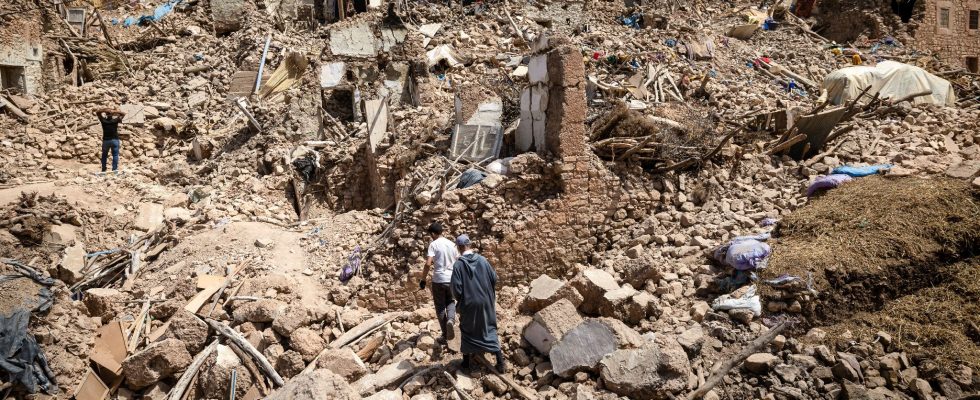Since the earthquake that hit Morocco on September 8, residents of the Marrakech region have been mourning their dead and living in fear of the collapse of their homes. Against the wave of international solidarity which is spreading towards Moroccans, Algerians rejoiced at the disaster on social networks. Some have thus interpreted it as a divine punishment in retaliation for the normalization of Moroccan diplomatic relations with Israel. Others even went so far as to regret that the earthquake was not harsher on a country they consider “unfaithful”.
At first glance, such cruelty seems incomprehensible. Algeria and Morocco, two Arab countries, share language, culture and even the majority religion. Not to mention that this earthquake, of rare intensity for the region, killed nearly 3,000 people and injured thousands. It would therefore seem logical that such a tragedy would give rise to a movement of absolute solidarity, whatever the political disagreements. But the hostile reactions are far from being the work of just a handful of influencers…
“Shameful Moroccan elite”
“I have no solidarity with Morocco, my family suffered from defamation and slander from the shameful Moroccan elite,” Algerian television host Ahmed Hafsi tweeted on X, according to whom “the majority [des Marocains] “are engaged in campaigns of bullying and mockery against the martyrs of Algeria”. Many Algerians make such remarks, considering that Morocco “deserved it”.
On social networks, for example, we can hear in a video an extremist asking his God that other earthquakes hit Moroccans, begging him to ensure that they are “buried under stones and earth”. According to him, the disaster of September 8 was “the fruit of the prayers of citizens [de la partie du Sahara occidental] occupied by Morocco”. Another video widely distributed on YouTube shows hundreds of people celebrating the earthquake in northern Algeria, near the Moroccan border. On TikTok, some took advantage of the drama to invite Moroccans to return to their “Algerian brothers”, instead of remaining on the side of the “Zionists”.
“Algerian hatred towards Morocco is transmitted from one generation to another, nothing can justify it, it will continue as long as the military regime is in place. The real enemies are not the Israelis, but our Algerian neighbors” , judge, for his part, the YouTube channel “La voix du Maroc”.
Many Algerians have certainly declared their solidarity with the Moroccans. In the media, some even said they were ready to donate blood if their government decided to open the borders. Officially, Algeria authorized the overflight of its airspace – closed since September 2021 – to aircraft transporting humanitarian aid and the wounded, and offered its assistance to the “brotherly Moroccan people” in case the kingdom requested it. . Offer that Rabat announced it was refusing on September 12. Proof, if any were needed, of the extent of the divisions that have opposed the two neighboring states for decades…
Dissensions around the Sahara
For many Arabs, Algeria is “the country of a million martyrs”, in reference to French colonization from 1830 to 1962. This territory is thus perceived as the incarnation of sacrifice for Arab liberation and independence. , and embodies belonging to Arabism. An image largely attributable to the nationalist Houari Boumediene, president from 1965 to 1978, one of whose feats of arms was to have imposed the Arabic language in the country and who was, in 1974, the first head of state to speaking Arabic at the UN. For him, the borders between Arab countries had to be removed to form a single nation in order to liberate Palestine.
A wish that is difficult to achieve, given the “War of the Sands”, which opposed Morocco and Algeria in 1963-1964 over the drawing of borders between the two countries in Western Sahara, a territory rich in phosphate. Morocco had thus claimed part of this region, which belonged to Algeria following independence, recalling that it was Moroccan before colonization. What Algeria had refused.
This war, led by Boumediene, lasted almost five months, leaving hundreds dead on both sides. Finally, a ceasefire was established on the condition of studying the delineation of the borders and submitting to both parties concrete proposals for the definitive settlement of this question. But the problem was never resolved.
“No solution to this crisis”
Competition and accusations continued, notably during the Algerian civil war (1992-2002). This accused Morocco of being behind several attacks on its territory. While Rabat accused Algiers of supporting the Polisario Front, the armed movement for the liberation of Western Sahara.
A sign of the extent of the discord: when the UN special envoy to Western Sahara in 2000, James Baker, visited the two parties in conflict, he ended up declaring that it was “impossible to resolve this dispute”. This situation lasted until 2021, the year when Algeria judged that the normalization of diplomatic relations between Morocco and Israel under American aegis was directed against it. Indeed, this normalization also involved the recognition by the United States of Rabat’s sovereignty over Western Sahara. Result: Algeria cut all diplomatic relations and closed its borders with Morocco.
After decades of tensions, the September 8 earthquake could have been an opportunity to change relations between the two countries. But, for the moment, Rabat does not seem ready to put political disagreements aside to accept the outstretched hand of its enemy brother. Even to encourage a new beginning.
* Writer and poet born in Damascus, Omar Youssef Souleimane participated in demonstrations against the regime of Bashar el-Assad, but, hunted by the secret services, had to flee Syria in 2012. Refugee in France, he published with Flammarion The Little Terrorist, The Last Syrian And A room in exile. He publishes at the start of the school year Being French.
